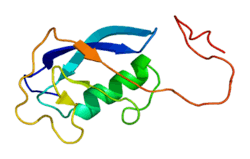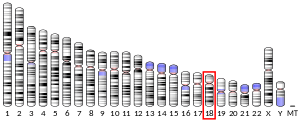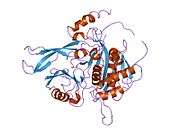USP14
Ubiquitin-specific protease 14 is an enzyme that in humans is encoded by the USP14 gene.[5][6]
This gene encodes a member of the ubiquitin-specific processing (UBP) family of proteases that is a deubiquitinating enzyme (DUB) with His and Cys domains. This protein is located in the cytoplasm and cleaves the ubiquitin moiety from ubiquitin-fused precursors and ubiquitinylated proteins. Mice with a mutation that results in reduced expression of the ortholog of this protein are retarded for growth, develop severe tremors by 2 to 3 weeks of age followed by hindlimb paralysis and death by 6 to 10 weeks of age. Alternate transcriptional splice variants, encoding different isoforms, have been characterized.[6]
Interactions
USP14 has been shown to interact with CXCR4.[7]
References
- GRCh38: Ensembl release 89: ENSG00000101557 - Ensembl, May 2017
- GRCm38: Ensembl release 89: ENSMUSG00000047879 - Ensembl, May 2017
- "Human PubMed Reference:". National Center for Biotechnology Information, U.S. National Library of Medicine.
- "Mouse PubMed Reference:". National Center for Biotechnology Information, U.S. National Library of Medicine.
- Puente XS, Sánchez LM, Overall CM, López-Otín C (Jul 2003). "Human and mouse proteases: a comparative genomic approach". Nat Rev Genet. 4 (7): 544–58. doi:10.1038/nrg1111. PMID 12838346.
- "Entrez Gene: USP14 ubiquitin specific peptidase 14 (tRNA-guanine transglycosylase)".
- Mines MA, Goodwin JS, Limbird LE, Cui FF, Fan GH (Feb 2009). "Deubiquitination of CXCR4 by USP14 is critical for both CXCL12-induced CXCR4 degradation and chemotaxis but not ERK activation". J. Biol. Chem. 284 (9): 5742–52. doi:10.1074/jbc.M808507200. PMC 2645827. PMID 19106094.
Further reading
- Wilson SM, Bhattacharyya B, Rachel RA, Coppola V, Tessarollo L, Householder DB, Fletcher CF, Miller RJ, Copeland NG, Jenkins NA (2002). "Synaptic defects in ataxia mice result from a mutation in Usp14, encoding a ubiquitin-specific protease". Nature Genetics. 32 (3): 420–425. doi:10.1038/ng1006. PMID 12368914.
- D'Andrea A, Pellman D (1999). "Deubiquitinating enzymes: a new class of biological regulators". Crit. Rev. Biochem. Mol. Biol. 33 (5): 337–52. doi:10.1080/10409239891204251. PMID 9827704.
- Deshpande KL, Seubert PH, Tillman DM, Farkas WR, Katze JR (1996). "Cloning and characterization of cDNA encoding the rabbit tRNA-guanine transglycosylase 60-kilodalton subunit". Arch. Biochem. Biophys. 326 (1): 1–7. doi:10.1006/abbi.1996.0039. PMID 8579355.
- Reuter TY, Medhurst AL, Waisfisz Q, Zhi Y, Herterich S, Hoehn H, Gross HJ, Joenje H, Hoatlin ME, Mathew CG, Huber PA (2003). "Yeast two-hybrid screens imply involvement of Fanconi anemia proteins in transcription regulation, cell signaling, oxidative metabolism, and cellular transport". Exp. Cell Res. 289 (2): 211–21. doi:10.1016/S0014-4827(03)00261-1. PMID 14499622.
- Dennehey BK, Gutches DG, McConkey EH, Krauter KS (2004). "Inversion, duplication, and changes in gene context are associated with human chromosome 18 evolution". Genomics. 83 (3): 493–501. doi:10.1016/j.ygeno.2003.08.017. PMID 14962675.
- Hu M, Li P, Song L, Jeffrey PD, Chenova TA, Wilkinson KD, Cohen RE, Shi Y (2005). "Structure and mechanisms of the proteasome-associated deubiquitinating enzyme USP14". EMBO J. 24 (21): 3747–56. doi:10.1038/sj.emboj.7600832. PMC 1276716. PMID 16211010.
- Shinji S, Naito Z, Ishiwata S, Ishiwata T, Tanaka N, Furukawa K, Suzuki H, Seya T, Matsuda A, Katsuta M, Tajiri T (2006). "Ubiquitin-specific protease 14 expression in colorectal cancer is associated with liver and lymph node metastases". Oncol. Rep. 15 (3): 539–43. doi:10.3892/or.15.3.539. PMID 16465409.
- Crimmins S, Jin Y, Wheeler C, Huffman AK, Chapman C, Dobrunz LE, Levey A, Roth KA, Wilson JA, Wilson SM (2006). "Transgenic rescue of ataxia mice with neuronal-specific expression of ubiquitin-specific protease 14". J. Neurosci. 26 (44): 11423–31. doi:10.1523/JNEUROSCI.3600-06.2006. PMID 17079671.
External links
- Overview of all the structural information available in the PDB for UniProt: P54578 (Ubiquitin carboxyl-terminal hydrolase 14) at the PDBe-KB.









